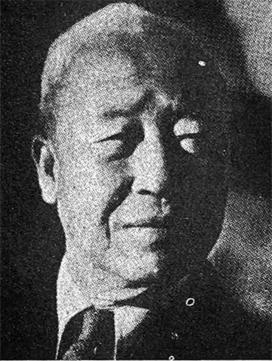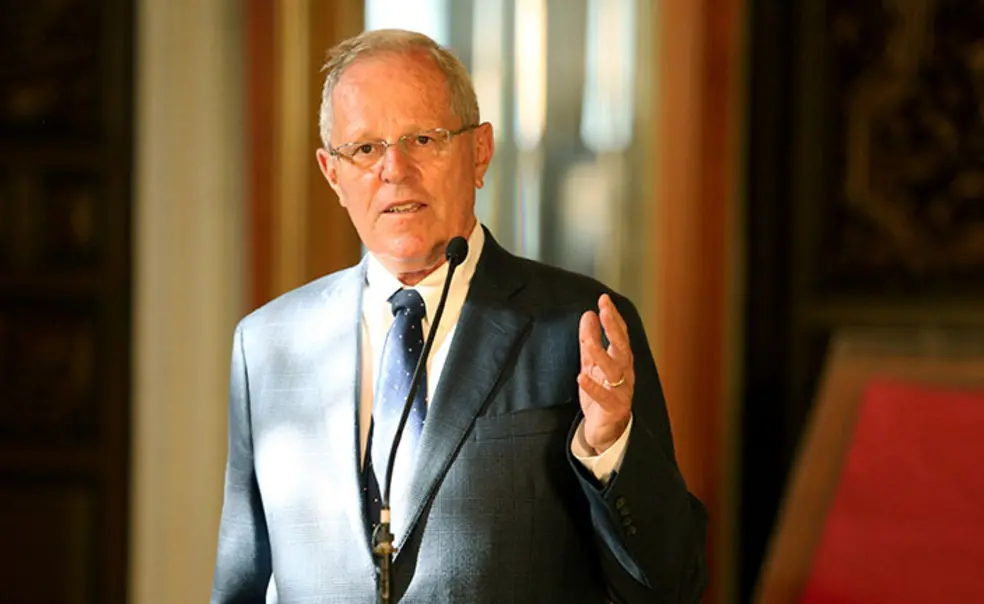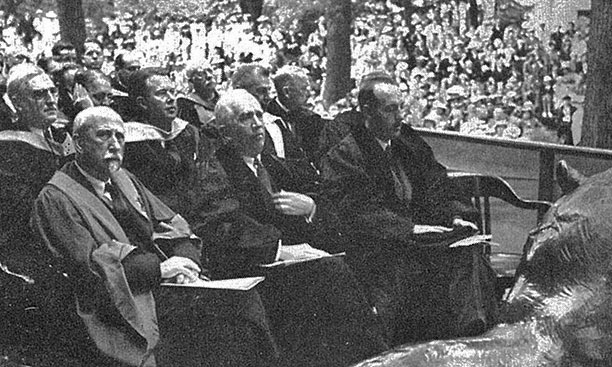If you want to save Peru, go save Peru. It’s quite possible to do anything, but not to put it on the leaders and the parking meters. Don’t expect Jimmy Carter or Ronald Reagan or John Lennon or Yoko Ono or Bob Dylan or Jesus Christ to come and do it for you. You have to do it yourself.
— John Lennon
Once upon a time, there was a land whose head of government was elected directly by popular vote (this certainly leaves a number of obvious places out of the discussion). Over the decades, the country fell prey to many of the vagaries of a democracy: military interference, families trying to establish informal succession by nepotism, various forms of graft and self-dealing. In 2011, a senior statesman with extensive experience in various government departments and a lengthy track record in economics and financial-services positions on the global stage ran for the presidency. He lost. Having decided that the only way to succeed was to go directly to the people to create a new party, he ran again in 2016 and, against long odds, obtained a majority of the runoff presidential vote while his party won only 14 percent of the seats in Congress. Despite being the son of refugee immigrant parents, despite having been exiled from the country in his youth by a military junta, despite the temptation to rest on the laurels of his international reputation, despite being 78 years old, he felt that his calling was to work for his country.
On one of his crucial stops along the way, Pedro Pablo Kuczynski *61 polished up his Oxford degree by winning a fellowship to Princeton, and completing a master’s in public affairs at the Wilson School. And so it is that the James Madison Medal this Alumni Day will be given to a substantive politician — just not one from around here. Kuczynski is the first sitting head of state to receive the award.
In a time when 42 percent of graduate students at Princeton are not citizens of the United States, this seems not particularly dramatic, but in 1961, the proportion was far lower. Still, this exotic international flavor has always seemed to take root first among the (intellectual? cosmopolitan? peculiar?) graduate-student body before trickling down to the undergrad world — now about 12 percent international — and it is hardly a surprise that a wide range of global governmental leaders have studied at the grad school on their way to positions of responsibility in their homelands.
Just to cite a few intriguing examples from Princeton’s long history in this arena, the roster includes Fakhruddin Ahmed *75 (economics), Bangladeshi central banker who headed an interim government there for two years; Arminio Fraga *85 (economics), Brazilian central banker and Madison Medal winner, now a University trustee; Josephat Karanja *62 (history), university chancellor and vice-president of Kenya; Manuel Camacho Solis *72 (Woodrow Wilson School), mayor of Mexico City; Chen Pi-Chao *66 (politics), defense minister in Taiwan; Rakesh Mohan *77 (economics), Indian central banker; David Dodge *72 (economics), governor of the Bank of Canada; Zhu Min *88 (Woodrow Wilson School), Chinese central banker; Juan Carlos Pinzon *10 (Woodrow Wilson School), defense minister of Colombia; Louka Katseli *78 (economics), Greek minister and economist; Kemal Dervis *73 (economics), deputy prime minister of Turkey; and Jean-Claude Bejaux *77 (romance languages), Haitian human-rights activist and culture minister.
As you look at this intriguing group from across the globe, you might well think that this expanding worldview and outreach at the graduate level began during the Goheen administration and gained momentum from there. But in fact, from the very beginnings of the Graduate School in 1900, the seeds of a global perspective were there.
The first major example was an eventual world leader who attended so early that history, politics, and economics was still a single combined department. Still, in 1908 the University’s international credentials were on the rise; Princeton in Asia had already been active for 10 years. Syngman Rhee *1910, Princeton’s first Korean graduate, was a go-getter and liberationist; at 30 years old the Russo-Japanese War of 1905 got him released from a life sentence in prison, where he had been tortured for actions against a Japanese/Russian-friendly Korean government. He’d converted to Christianity as a young man, and he left for the United States, earning a bachelor’s degree at George Washington University and a master’s at Harvard by 1908. Then Rhee chatted up Andrew Fleming West 1874, dean of the 8-year-old Princeton grad school, about going after a Ph.D. Rhee insisted on trying to do it in two years — frowned on by the administration — while taking additional courses at the Princeton Seminary so he could qualify for room and board there (the Graduate College was still five years away from being built). He did indeed finish his doctorate in 1910, taking his exams in politics and completing, heavily reworking, and defending a dissertation on neutrality as influenced by the United States. (A large part of his file, fascinating in its detail of the early days of the grad school, has been placed online by our friends at the University Archives.)

By then, the imperialist Japanese had annexed Korea, and when Rhee returned home he ended up arrested again, then went into exile where he became the first president of the Provisional Government of the Republic of Korea from 1919 to 1925. When South Korea became independent after World War II, he was elected its first president in 1948 and ruled with increasing autocracy through the Korean War, until ousted by a student-led rebellion in 1960. His legacy remains controversial there today, but not so much as to prevent Korean alumni from raising funds to name Woodrow Wilson School Bowl 16 in his honor in 2010, the 100th anniversary of his degree. Chung Un-chan *78 (economics), former South Korean prime minister and Seoul National University president, was there to honor Rhee’s accomplishments.
Another early but less ambiguous example of grad school-trained global leadership is Paul van Zeeland 1921. A student of economics who was impressed with American contributions to World War I, the Belgian-born van Zeeland came to Princeton for a master’s degree and returned to teach in his native country. He later joined the national bank and finally became the prime minister in an anti-fascist government (1935-1937) that re-established the country’s neutrality, which of course did it little good in the subsequent Nazi onslaught. After World War II, he served multiple Belgian governments as foreign minister and was a financial adviser both to his government and NATO. He was an honored world leader of rationality and compassion.
At the height of his power and responsibility in a turbulent world, the prime minister returned to Princeton on June 22, 1937, to receive an honorary doctorate and the warm appreciation of Americans. As he sailed westward to the ceremony the week prior, he appeared on the cover of Time magazine.
Often, I fear, we at Princeton stereotypically view graduate students as narrowly focused — willing to put in the long hours and perhaps even converse under duress with an undergrad or two, but fixated, laser-like, on abstruse, hifalutin ends of their own devising. Van Zeeland, to the contrary, when given the opportunity to address the Commencement audience, in the midst of a Depression and the rapid rise of totalitarian threats to world order, recalled the moment he received his master’s 16 years before:
I wanted to make my life useful to my country, and to make it worthy of those here at Princeton, who aided me to forge my armor for the battle of life. In addition, I felt myself strongly imbued with that wonderful esprit de corps which contributes so largely to the grandeur of American universities, and so distinctly characterizes Princeton. I wanted to conduct myself as a “Princeton Man” and, as a true son of Princeton, at some time, some day in the dim and distant future, to be an honor to the alma mater.
I don’t know what President Kuczynski will talk about the morning of Alumni Day, but I suspect that foreigners — consider van Zeeland’s example — often appreciate what we have here more than we do, or at least in a much fresher way, and they tend to use our precious, scarce resources accordingly. Even aside from our Constitution and the immigrants’ families who wrote it, this makes America’s periodic attempts at closing its borders in various ways so myopically stupid, and in the end, futile.
Imagine all the people sharing all the world. If you want to save Peru, go save Peru.
Dei sub numine viget.













1 Response
George L. Bustin ’70
8 Years AgoInteresting, enjoyable...
Interesting, enjoyable article, Mr. Lange. Did not know Paul van Zeeland had such close ties to Princeton. He is still revered in Belgium. And as former ASC chair there, I can testify that the Princeton name has resonance there, too.